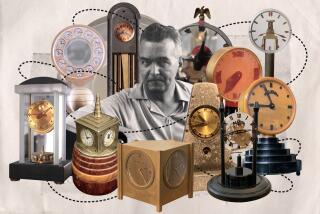‘It’s What You Know’ : Time and Time Again, Clockmaker, 84, Triumphs
- Share via
READING, Pa. — The uneven passage of time has treated Miles Reist gently.
Time has provided the 84-year-old clockmaker with a comfortable living, a daily challenge and a status among the socially elite of Berks County.
In the 70 years that Reist has preserved the treasured timepieces of his area’s rich and famous, he has gained a privileged glimpse into households known mostly only by reputation--or rumor.
“I have good clientele,” the pleasant, sandy-haired horologist said. “I’m a terrific clockmaker!”
Surrounded by the ticking, clanging, chiming timepieces in his confined clock shop, he paused and observed wryly, “You don’t get rich at it, but you make a good living.
“You don’t work cheap. Your talent is worth something. It’s not exactly what you do, it’s what you know. If you have to fool around all day with a clock to find out what’s wrong with it, you’re not making any money. The minute you look at a clock, you have to know what’s wrong with it.”
Good Nerves Needed
In his own home, Reist has 50 clocks, constantly chiming and frantically tick-tocking.
“You’ve got to have good nerves to live in this house,” he said. “I wind them every Friday morning about 9 o’clock.”
Reist still works full time. He drives to the homes of customers, where he removes the works from clocks and makes repairs in his shop.
Reist, a widower, is a clockmaker of singular talent. Although many a clock has tried his patience, none has defied his ability, he said.
“Some of those clocks were tough--and they still are,” he said. “That’s because they’re wearing out--like I am.”
What distinguishes Reist from his associates is his ability and the equipment to make clock parts: a milling machine to cut gears, a drill press, a lathe.
“They don’t make the parts anymore for many of these old clocks, and many clock-making firms have gone out of business,” he said. “Where do you get parts for chime clocks? You have to make them.
“I have a lot of knowledge about clocks. I can make the parts. Most people just clean ‘em. In 70 years, you learn a lot.”
The biggest clock of the estimated 50,000 Reist has worked on was 9 feet tall. He used a ladder to work on it. On the opposite end, he recalled working on a clock with works the size of a wristwatch.
Reist said it is important for a clockmaker to have good eyes and a steady hand. He added patience as the most important virtue.
Running Out of Patience
“Patience gets all sometimes,” he said. “You run out of it. When that happens, I run around the yard. I had clocks already that gave me so much trouble I felt like throwing them out the back door. But I conquered them.
“Cuckoo clocks with music boxes are the toughest to fix. I’ve repaired thousands of cuckoo clocks. I have one out there now that’s giving me trouble.”
Still, despite the frustrations, Reist isn’t planning on retiring.
“I had my horoscope read some time ago. It said I can reach 90, but what do they know?”
Time will tell.
More to Read
Inside the business of entertainment
The Wide Shot brings you news, analysis and insights on everything from streaming wars to production — and what it all means for the future.
You may occasionally receive promotional content from the Los Angeles Times.










